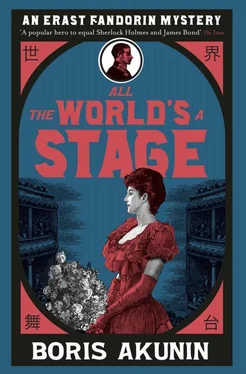That was another reason why she couldn’t put Erast’s life at risk: her responsibility to literature and the theatre. A man who had never taken up the pen before and then suddenly created a masterpiece – yes, yes, a masterpiece! – could become a new Shakespeare! Let Mephistov pull a wry face and whisper that this little play was convenient for Stern’s theory, but there was nothing else interesting about it. He was simply furious that he had been handed a skimpy little role, the most disagreeable of all. A play that was dictated by love could not help but be great! And there was no greater homage for a woman than to be an artist’s inspiration, his muse. Who would remember a girl called Laura, that little girl Beatrice or the frivolous Anna Kern if not for the great works dedicated to them? Thanks to Eliza Lointaine, a glorious new name would shine in the firmament of dramatic art. So how could she allow it to be extinguished because of her?
She took a grip on herself and chained up her poor heart. The next day, when Fandorin came rushing to see her in order to discover what was wrong, Eliza was reserved and even cold with him. She pretended not to understand why he addressed her in such a familiar manner. She made it clear that what had happened the day before had been cancelled out. It quite simply had not happened – and that was all there was to it.
She only had to hold out for the first two minutes. Eliza knew that as a proud man he would not start trying to clarify their relationship, let alone pursuing her. And she was right. After two minutes Fandorin turned deadly pale, lowered his eyes and chewed on his lips as he struggled with himself. When he looked up again, the expression of his eyes was completely different – as if someone had closed the curtains tightly.
‘Well then, goodbye,’ he said. ‘I shall not trouble you again.’ And he left.
God only knew how she managed not to burst into tears. She was only saved by an actor’s habit of controlling the external expression of her feelings.
After that he stopped coming to the rehearsals. In fact, there was no particular need for him to come. All the questions about the Land of the Rising Sun could be answered by the Japanese, who took his work with exemplary seriousness: he arrived before everyone else and left after everyone else, and proved to be exceptionally diligent. Noah Noaevich could not have been more delighted with him.
All in all, getting rid of Fandorin had proved even easier that Eliza thought. She even felt rather annoyed about it. Arriving at the theatre at eleven, she kept waiting to see whether he would show up, and summoning up the inner strength to be firm. But Erast didn’t come and the effort of summoning was wasted. Eliza was suffering. She consoled herself with the thought that it was all for the best and the pain would be blunted in time.
Working on her part helped her a lot. There were so many interesting things about it! It turned out that Japanese women, and especially geishas, walked differently from European women and bowed differently, and they spoke and sang and danced in special ways. Eliza imagined herself as a living embodiment of the most elegant of the arts, a devoted acolyte of ‘ yugen ’, the Japanese ideal of unmanifest beauty. It was not easy to grasp this concept: what was the point of Beauty if it concealed itself from sight and shrouded itself in veils?
Noah Noaevich spouted new ideas every day like a fountain. He suddenly started restyling the already complete design of the play: ‘Since the play is written for a puppet theatre, let’s play it in puppet style!’ he declared. ‘The actors not involved in a scene put on black robes and turn into puppeteers. They seem to lead a character about, tugging on his strings.’ And he demonstrated a jerky style of movements. ‘The point is that the characters are puppets in the hands of karma, of implacable Fate. But at a certain moment, Eliza, your puppet suddenly snaps its strings and starts moving like a living person. That will be spectacular!’
During the breaks, emerging from the enchanted onstage condition in which one feels neither fear nor pain, Eliza seemed to clench up tight as the appalling burden of reality descended on her with all its dead, dusty weight. The phantom of Genghis Khan hovered in the dark depths of the wings, murdered love scraped at her heart with a cat’s sharp claws, and if she went out into the corridor, there was a dead maple leaf sticking to the windowpane – autumn, probably the last autumn of her life…
The only breath of air during these unavoidable intervals in work were her conversations with Fandorin junior. Naturally, Eliza didn’t dare to demonstrate her interest in Erast Petrovich too clearly, she had to restrain herself, but even so, every now and then, between the discussions of Japanese bits and pieces, she managed to direct the conversation to more important matters.
‘But you have been married?’ Eliza asked one day when Mikhail Erastovich happened for some reason to mention that he was a bachelor.
‘No,’ the Japanese replied with a joyful smile. He smiled joyfully almost all the time, even when there was no apparent reason for it.
‘And your… stepfather?’ she went on casually. As a matter of fact, she still hadn’t discovered in what circumstances Erast had acquired such an unusual stepson. Perhaps as a result of marriage with a Japanese woman? She decided to investigate that subject later.
Mikhail Erastovich thought for a bit, thought again and replied:
‘Not to my recorrection.’
‘Have you known him for a long time?’
‘More than cirty years,’ the Japanese said radiantly. Eliza had already grown accustomed to his imperfectly pronounced but entirely understandable and almost correct Russian.
She cheered up a bit at that: so Erast (he was about forty-five, wasn’t he?) had never been married. For some reason she felt glad about that.
‘Why hasn’t he ever married?’ she asked, pursuing the theme.
The round face of the Japanese took on a serious expression. He rubbed the stubble on the top of his head (Stern had ordered him not to shave his head for the show, it was unromantic).
‘He was unabur to find a woman worthy of him. That is what he tord me many times.’
‘Well, well, what high self-opinion!’ A caustic note crept into Eliza’s voice. ‘And did he try very hard?’
‘He tried very hard,’ Mikhail Erastovich confirmed. ‘Many women wished to marry him. He tried and he tried – he used to ask me: What do you cink, Masa? No, I said, she is not worthy. He agreed. He orways ristens to what I say.’
Eliza sighed and took note of that.
‘So he tried a lot of women?’
‘Very many! There were genuine princesses, there were revorutionaries. Some women were rike andjers, others were worse than the devir.’
‘Beautiful?’ she asked, forgetting about caution. The conversation had turned out too enthralling altogether.
Masa (that name suited him better, she thought, than ‘Mikhail Erastovich’) grimaced in a strange manner.
‘My master has sutrange taste,’ he said, and then, seeming suddenly to recall something, he corrected himself. ‘Very beautifur.’
And he even demonstrated exactly how beautiful they were: with a huge bust, full sides, immensely wide hips and tiny little eyes.
Fandorin really does have strange passions , Eliza concluded. He likes big women, I’m not to his taste at all.
At that point she started pondering and became sad, and the conversation ended. Eliza didn’t even ask why Masa called Fandorin ‘master’.
On closer acquaintance, however, it emerged that not all information acquired from the Japanese should be taken on trust. Her stage partner proved to be no novice when it came to telling a few fibs, or at least fantasising a little.
Читать дальше









